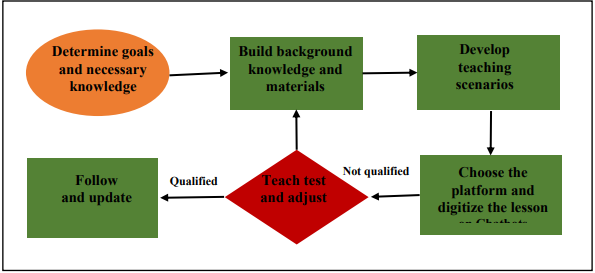The Process Of Building A Virtual Teacher According To Self-Regulated Learning In Teaching Maths In Primary Schools

Submission to VIJ 2024-02-03
Keywords
- Chatbot, Virtual Teacher, Self-regulated learning, Teaching maths in primary school
Copyright (c) 2024 Nguyen Minh Giam, Nguyen Thi Hoai Nam, Nguyen Van Doc

This work is licensed under a Creative Commons Attribution 4.0 International License.
Abstract
Chatbot is a program that interacts with users via textual or auditory. Nowadays, Chatbots are widely used in jobs such as virtual assistants for customer care, product introduction, sales, etc. Chatbots have also been applied in many different aspects of the field of education thanks to the benefits it brings including high personalization, high interactivity, speed, accuracy, etc. A popular application of Chatbots in education is using Chatbots to teach. This article analyzes the benefits that Chatbots bring to the field of education, thereby providing a process for designing a teaching Chatbot for a specific lesson in the direction of self-regulated learning to help teachers and educators have orientation in using Chatbot in teaching.
References
- Abbasi, S., & Kazi, H. (2014). Measuring effectiveness of learning chatbot systems on student’s learning outcome and memory retention. Asian Journal of Applied Science and Engineering, 3(2), 251-260.
- Dignath, C. & Buttner, G. (2008). Components of fostering self-regulated learning among students. A meta-analysis on intervention studies at primary and secondary school level. Metacognition and Learning, 3, 231-264.
- Grossman, J., Lin, Z., Sheng, H., Wei, J. T. Z., Williams, J. J., & Goel, S. (2019). MathBot: Transforming online resources for learning math into conversational interactions. AAAI 2019 Story-Enabled Intelligence.
- Hidajat, F. A. (2022). Self-Regulated Learning for Creative Mathematics Teaching to Secondary School Students Through Mobile E-Learning Applications. International Journal of Interactive Mobile Technologies, 16(19).
- Lo, C. K. (2023). What is the impact of ChatGPT on education? A rapid review of the literature. Education Sciences, 13(4), 410.
- Mageira, K., Pittou, D., Papasalouros, A., Kotis, K., Zangogianni, P., & Daradoumis, A. (2022). Educational AI Chatbots for Content and Language Integrated Learning. Applied Sciences, 12(7), 3239.
- Maroengsit,W., Piyakulpinyo, T., Phonyiam,K., Pongnumkul,S., Chaovalit,P. and Theeramunkong,T. 2019. A Survey on Evaluation Methods for Chatbots. In Proceedings of the 7th International Conference on Information and Education Technology (ICIET 2019). ACM, New York, NY, USA, 111-119. DOI=10.1145/3323771.3323824
- Molnár,G. and Szüts, Z. 2018. The Role of Chatbots in Formal Education, IEEE 16th International Symposium on Intelligent Systems and Informatics (SISY), Subotica, 197-202. doi= 10.1109/SISY.2018.8524609
- Nam, N. T. H., & Giang, N. T. H. Design of Knowledge Flow According to the Approach of Self-Regulation Learning for Teaching Maths on Chatbot.
- Nuankaew, P. (2022). Self-regulated learning model in educational data mining. International Journal of Emerging Technologies in Learning (Online), 17(17), 4.
- Pintrich, P. R. (2000). The role of goal orientation in self-regulated learning. In Handbook of self-regulation (pp. 451-502). Academic Press.
- Redaelli, J. C., & Lima Jr, O. F. (2013). Self-regulated learning strategies applied to undergraduate, graduate and specialization students from civil engineering. International Journal of Engineering Pedagogy (IJEP), 3(S2), 23-26.
- Suartama, I., Setyosari, P., Sulthoni, S., Ulfa, S., Yunus, M., & Sugiani, K. (2021). Ubiquitous learning vs. electronic learning: a comparative study on learning activeness and learning achievement of students with different self-regulated learning. International Journal of Emerging Technologies in Learning (iJET), 16(3), 36-56.
- Vázquez-Cano, E., Mengual-Andrés, S., & López-Meneses, E. (2021). Chatbot to improve learning punctuation in Spanish and to enhance open and flexible learning environments. International Journal of Educational Technology in Higher Education, 18(1), 1-20.
- Winkler, zR., & Söllner, M. (2018). Unleashing the potential of chatbots in education: A state-of-the-art analysis. In Academy of Management Annual Meeting (AOM).
- Zimmerman, B. J., & Moylan, A. R. (2009). Self-regulation: Where metacognition
